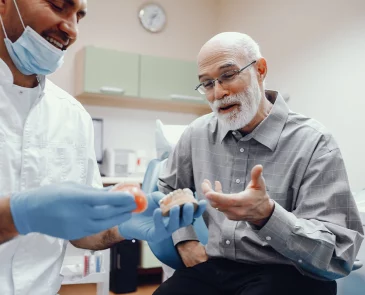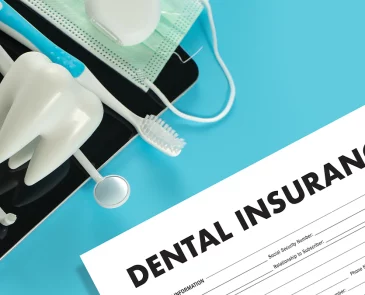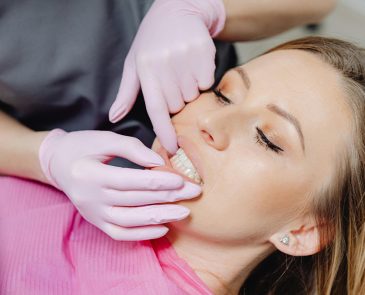Managing Dental Anxiety – Tips for a Stress-Free Dental Visit
Dental anxiety describes an unease about dental appointments. It is a very common problem that affects as many as 36% of the population. This anxiety can deter individuals from regular dental care, which causes severe oral health issues.
Additionally, the deterrence from dental care will worsen existing conditions, which results in traumatic experiences at the dentist’s office. This will create a vicious cycle that worsens over time.

The stress, fear, or apprehension that individuals feel when they think about or visit the dentist ranges from mild unease to severe phobia (i.e., dental phobia).
In this article, we will cover everything you need to know about dental anxiety, including some evidence-based tips to help you get rid of it.
Symptoms of dental anxiety
Symptoms of dental anxiety can vary from person to person.
Common signs and symptoms of dental anxiety include:
- Heart palpitations
- Panic attacks
- Low blood pressure
- Aggressive behavior
- Extreme sweating
- Crying
- Feeling faint
These symptoms can manifest before or during dental appointments, which impacts an individual’s ability to receive necessary dental care.
The vicious cycle of dental anxiety
The vicious cycle of dental anxiety refers to a recurring pattern that can severely impact an individual’s oral health. This cycle begins with a fear of dental visits, which is commonly triggered by past traumatic experiences, fear of pain, or generalized anxiety. This fear pushes the individual to avoid dental care. Over time, various dental issues arise such as cavities, gum disease, and tooth decay.
As these dental problems worsen, the need for more extensive and invasive dental treatments increases. The anticipation of these more complex procedures exacerbates the individual’s anxiety and fear, which makes them even more likely to avoid dental care. When these individuals finally do visit the dentist, it is commonly due to an emergency or severe pain that requires urgent and sometimes traumatic interventions. These negative experiences reinforce their fear and avoidance behavior, which contributes to the vicious cycle.
The physical responses to dental anxiety, such as increased pain perception and exaggerated memory of pain, further contribute to the distressing experience. Patients may demonstrate physiological symptoms such as heart palpitations, sweating, and panic attacks.
Causes of dental anxiety
Several factors contribute to dental anxiety, including:
Fear of pain
Many individuals fear the potential pain associated with dental procedures. This fear is commonly based on past painful experiences or stories from others.
Previous traumatic dental experiences
A history of traumatic dental experiences can precipitate anxiety about future dental visits. Negative past experiences can leave a lasting impact, especially during childhood.
Fear of loss of control
As a patient sits on a dental chair, it makes them feel vulnerable and out of control. This feeling is exacerbated when they cannot see what is happening or anticipate the next steps.
Generalized anxiety disorder
Individuals with a history of generalized anxiety disorder may find dental visits quite stressful. Their heightened anxiety can make dental appointments more challenging.
Trust issues
A lack of trust in dental professionals can also contribute to dental anxiety. If individuals do not trust their dentist’s skills or intentions, they are less likely to feel comfortable during procedures.
Fear of needles and drilling
The fear of needles and the sound of dental drills are common triggers for dental anxiety. These fears can make even routine dental visits daunting.
Fear of anesthesia side effects
Some people are anxious about potential side effects of anesthesia, such as feeling dizzy or nauseous.
Tips for a stress-free dental visit
There are several strategies to manage dental anxiety and make dental visits more bearable:
Communicate your concerns
Open communication with your dentist is indispensable. Inform them about your fears and anxieties so they can take steps to make the process more comfortable. This can include an explanation of each step of the procedure and answering any questions you may have.
Breathing exercises
Deep breathing exercises can calm your mind and reduce stress. Close your eyes, inhale slowly through your nose, hold for a few seconds, and then exhale slowly through your mouth. Repeat this several times to relax.
Meditation
Meditation can promote calmness and reduce anxiety. Focus on relaxing each part of your body. start from your head down to your feet. This practice can help you remain calm during your dental appointment.
Guided imagery
The visualization of happy or positive thoughts can help distract you from anxiety. Think about your happy place or recall pleasant memories to help calm your mind.
Hypnosis
Hypnotherapy involves achieving a trance-like state through guided relaxation. A hypnotherapist can use the power of suggestion to help reduce your anxiety.
Distraction
Distractions such as watching TV, listening to music, or wearing headphones during your dental appointment can help take your mind off the procedure.
Bring a friend with you
A supportive friend or relative with you can provide comfort and reduce anxiety. Their presence can make you feel safer and more relaxed.
Analgesia
Analgesics such as nitrous oxide (i.e., laughing gas) reduce pain and anxiety during dental procedures.
Consider medications
For moderate anxiety, your dentist may prescribe a short-acting anti-anxiety medication to take before your appointment.
Conscious sedation
Conscious sedation involves the intake of an oral sedative before your appointment. You will remain conscious but very relaxed.
General anesthesia
For severe dental anxiety, general anesthesia may be necessary. During general anesthesia, you will be fully asleep. It is typically administered in a hospital setting by an anesthesiologist.
Takeaway message
Dental anxiety is a common issue that can prevent individuals from essential dental care. However, with the right coping mechanisms and support, it is possible to manage this anxiety and ensure regular dental visits. Communication with your dentist, practicing relaxation techniques, and seeking support are all essential to get over this problem.
We hope that this article will serve as a guideline to help you get rid of dental anxiety and receive the care you need.
If you have any questions about dental anxiety, please feel free to share your thoughts in the comment section below.
Ready to overcome your dental anxiety and receive the care you need? Book an appointment with us today!





